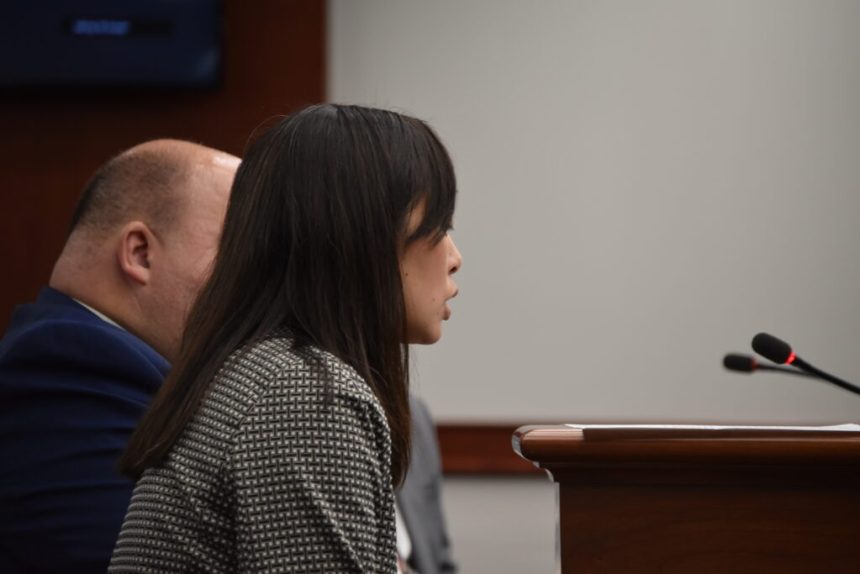Sen. Stephanie Chang (D-Detroit) presents a package of anti-human trafficking bills to the Senate Civil Rights, Judiciary, and Public Safety committee. Oct. 23. | Photo by Katherine Dailey/Michigan Advance.
A bipartisan group of state senators presented a package of bills seeking to prevent human trafficking by increasing punishments for perpetrators in a meeting of the Senate Civil Rights, Judiciary, and Public Safety committee last Thursday.
State Sens. John Damoose (R-Harbor Springs), Rosemary Bayer (D-West Bloomfield), Stephanie Chang (D-Detroit) and Michael Webber (R-Rochester Hills) each spoke to the committee on their respective bills.
“No law can singlehandedly eliminate human trafficking. It’s already illegal, but yet new victims are ensnared every single day,” Damoose said. “But the challenge we put forth in crafting this package was simple: to create laws where, by two years from today, a significant number of women or children or men will wake up and not be trafficked that day, who otherwise would have been without these laws, and that’s what I believe we have here today.”
Michigan has a nationally high rate of human trafficking, with only six states having a higher number of cases in 2024, according to the National Human Trafficking Hotline. There were 340 cases confirmed in Michigan last year, and 585 victims identified.
“Human trafficking is a crime of exploitation and using control and submission,” said Melissa Palepu, an Attorney Specialist in Human Trafficking and Child Abuse at the state Attorney General’s office. “Human trafficking, which includes both labor trafficking and sex trafficking, is a thriving enterprise in the world and in Michigan, making an estimated $254 billion a year in profits.”
Melissa Palepu, an Attorney Specialist in Human Trafficking and Child Abuse at the state Attorney General’s office, speaks in support of a package of anti-human trafficking bills to the Senate Civil Rights, Judiciary, and Public Safety committee. Oct. 23. | Photo by Katherine Dailey/Michigan Advance.
The bills, introduced as SB 520 through 524, would increase penalties for those found guilty of human trafficking, as well as increasing the age at which a victim is considered a child from 16 to 18 years old.
“It is important to adjust the sentencing of these crimes so we can better address the root cause of these problems by punishing the individuals who pay for and solicit these acts instead of victimizing the trafficked individual even further,” Webber noted.
Damoose further emphasized that the goal behind the bills was to disincentivize people from in any way involving themselves with trafficking, adding, “Importantly, if these bills pass, the state of Michigan will now be on record telling those who traffic a child that they may be going to prison for the rest of their life.”
However, some of those testifying raised concerns about those increased penalties being weaponized against trafficking victims themselves — especially regarding bills 522 and 523, which would allow for children to be removed from their parents’ care in the case of a trafficking conviction.
Megan Reynolds, a family law attorney at Michigan Poverty Law Program, explained an existing statute, which designates a parent as a perpetrator if, she said, “one is suspected of placing their child at an unreasonable risk of harm due to the parents failure to take reasonable steps to intervene to eliminate that risk,” including if they are in a situation where they themselves are being trafficked.
Under these bills, if passed, that would be grounds to terminate that person’s parental rights, immediately.
“In a powerless position where you’re being trafficked, you didn’t do enough to protect your child from the real trafficker,” Reynolds explained. “That would create grounds for that parent to not only have a petition to terminate their rights filed, but then to have that accelerated in the definition of aggravated circumstances.”
Meanwhile, Elizabeth Campbell, the director of the Human Trafficking and Immigration Clinic at the University of Michigan Law School cited statistics about how victims and survivors of trafficking themselves can face criminal charges related to their own trafficking.
“A National Survivor Network survey reported over 90% of survivors have been arrested, almost always for crimes tied directly to their trafficking,” she said.
Gonzalo Peralta, a Senior Staff Attorney at the Michigan Immigrant Rights Center, said that he wants to “ensure farm worker families, who are often victims of labor, traffic trafficking themselves, are not doubly penalized, and immigrants are not considered acceptable collateral damage.” This is especially important in today’s anti-immigrant climate, he added.
Chang, who also chairs the committee, acknowledged those concerns, and referenced a meeting between lawmakers and advocates to mitigate the potential harms.
“I want to ensure that we don’t cause any unintentional harm to parents who are themselves victims of human trafficking,” she said. “So we are going to continue to have more conversations on this topic to address those concerns and ensure that the final product of this bill comes out in the best form that it can to protect minors, other human trafficking victims and survivors, and holds traffic traffickers accountable.”
A package of bills, many regarding the rights of human trafficking victims, has also been introduced in the Michigan House of Representatives.
“This department believes that in order to eradicate human trafficking in Michigan, we must do the following,” Palepu said. “First, we must keep a victim centered approach and aim to provide survivors with legal protection as well as the ability to help heal and grow and become productive members of society. We do believe that the House package that is a companion package to this will address those. Second, we must strengthen our tools for prevention and increased accountability, which is what we believe the Senate bills will do.”
Bayer also noted in her statements introducing the bills that together they wanted to make sure that any legislation they created would focus on protecting victims first.
“We will always make sure that this legislation does stop the traffickers and protects those who are victims,” she stated. “Otherwise, it’s not worth our time.”
SUBSCRIBE: GET THE MORNING HEADLINES DELIVERED TO YOUR INBOX









